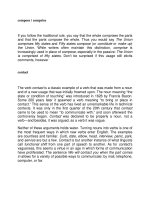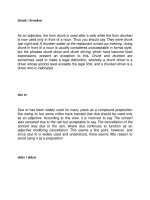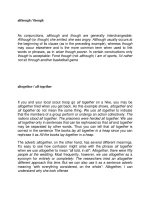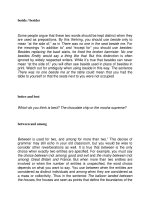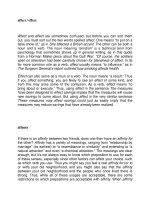Tài liệu Cách dùng tiếng Anh P1 doc
Bạn đang xem bản rút gọn của tài liệu. Xem và tải ngay bản đầy đủ của tài liệu tại đây (57.34 KB, 7 trang )
a / an
In modern written English, we use a before a word beginning with a
consonant sound, however it may be spelled (a frog, a university, a
euphemism). We use an before a word beginning with a vowel sound (an
orange, an hour). At one time, an was an acceptable alternative before
words beginning with a consonant sound but spelled with a vowel (an one,
an united appeal), but this usage is now entirely obsolete
An was also once a common variant before words beginning with h in
which the first syllable was unstressed; thus 18th-century authors wrote
either a historical or an historical, but a history, not an history. This usage
made sense in that people often did not pronounce the initial h in words
such as historical and heroic, but by the late 19th century, educated
speakers were usually giving their initial h’s a huff, and the practice of
writing an began to die out. Nowadays it survives primarily before the word
historical. You may also come across it in the phrases an hysterectomy or
an hereditary trait. These usages are acceptable in formal writing.
able
The construction able to takes an infinitive to show the subject’s ability to
accomplish an action: We were able to finish the project thanks to a grant
from a large corporation. The new submarine is able to dive twice as fast
as the older model. Some people think able to should be avoided with
passive constructions involving forms of the verb be: The problem was able
to be solved by using a new method. Since the problem has no ability to
accomplish an action, this reasoning goes, it is not able to do anything;
therefore able to should not be used. In such cases, you can usually
substitute can or could: The problem could be solved by using a new
method. Keep in mind, however, that passive constructions using the verb
get ascribe a more active role to their subjects, and here you can use able
to: He was able to get himself accepted by a top law school
about
The preposition about is traditionally used to refer to the relation between a
narrative and its subject: a book about Cezanne, a movie about the Boston
Massacre. Lately people have extended this use beyond narratives to refer
to the relation between various kinds of nouns and the things they entail or
make manifest: The party was mostly about showing off their new offices.
You don’t understand what the women’s movement is about. This usage
probably originates with the familiar expression That’s what it’s all about,
but remains controversial. Fifty-nine percent of the Usage Panel rejected
this use of about in the example A designer teapot isn’t about making tea; it
is about letting people know that you have a hundred dollars to spend on a
teapot
not about to
When followed by an infinitive, about to means “presently going to, on the
verge of,” as in I’m about to go downtown. The construction not about to
may be simply the negative of this, especially in response to questions: I’m
not about to go downtown. I’m about to go to the park. But in most
instances not about to expresses intention or determination, as in We are
not about to negotiate with terrorists. A majority of the Usage Panel
considers this usage acceptable in speech but not in formal writing
above
The use of above as an adjective or noun in referring to a preceding text is
most common in business and legal writing. In general writing, its use as an
adjective (the above figures) was accepted by a majority of the Usage
Panel in an earlier survey, but its use as a noun (read the above) was
accepted by only a minority
access
The verb access has become standard in reference to computers, as in
This program makes it considerably easier to access files on another disk.
In recent years, people have begun to extend access to nontechnical
contexts, giving it the broader meaning “to obtain goods, especially by
technological means.” But this sense has yet to gain acceptability with the
Usage Panel. Eighty-two percent reject the use of access in the sentence
You can access your cash at any of 300 automatic tellers throughout the
area
accompany
A traditional rule states that the preposition to use when accompany occurs
in passive constructions should be by in the case of persons and with in the
case of everything else. Thus you should say The candidate was
accompanied by six burly bodyguards, but The salmon was accompanied
with a delicious salad. However, by is quite commonly used in sentences of
the second type, and the usage is grammatically defensible. The phrase
introduced with by normally represents the subject of a related active
sentence. You can see this by converting the sentence The salmon was
accompanied by a delicious watercress salad to its active counterpart A
delicious salad accompanied the salmon
acquiesce in / acquiesce to
When acquiesce takes a preposition, it is usually used with in: No
government acquiesces in its own overthrow. The preposition to is less
common, but also acceptable: She acquiesced to her parents’ wishes.
Acquiesced with is obsolete
act / action
The words act and action both mean “a deed” and “the process of doing.”
However, other senses of act, such as “a decision made by a legislative
body,” and of action, such as “habitual or vigorous activity,” show that act
tends to refer to a deed while action tends to refer to the process of doing.
Thus people commit sex acts every day, but never sex actions. If they are
seen, they are caught in the act, but not in the action. By the same token,
they may want a piece of the action, but not of the act. As you can see, the
demands of meaning or idiom often require one word or the other. But in
cases where either can be used, either is acceptable: My act (or action)
was premature
admission / admittance
Some people insist that admittance should be used only to refer to
achieving physical access to a place (He was denied admittance to the
courtroom) and that admission should be used to refer to achieving entry to
a group or institution (her admission to the club, China’s admission to the
United Nations). There is no harm in observing this distinction, but don’t be
surprised if you see others ignoring it, for many people do. Admission is
much more common in the sense “a fee paid for the right of entry”: The
admission to the movie was five dollars
adopted / adoptive





